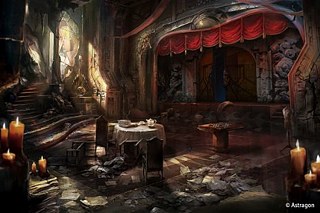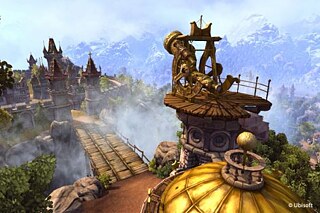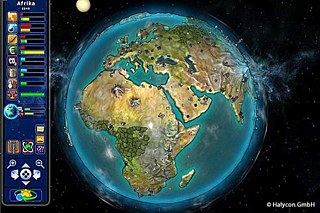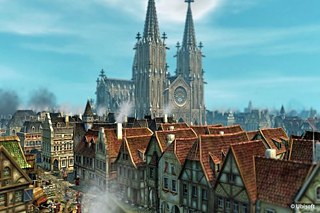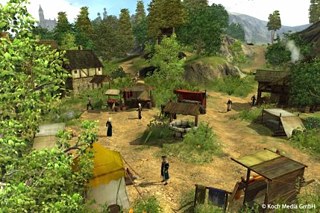Regional Studies in computer games
The Playful Way to Get to Know Germany

Games enable people to immerse themselves in a culture and to experience history hands-on, says Thorsten Unger, CEO of the Bundesverband der deutschen Games-Branche (Federation of the German Games Industry – GAME).
Mr. Unger, “Serious games”, i.e. games with an educational purpose, are gaining more and more importance in Germany, but the name “serious games” – isn’t that a paradox?
At first the name may well sound like a contradiction in terms as seriousness is seemingly incompatible with the activity of playing games – after all playing games always presupposes people do it voluntarily. In this case, however, it is all about combining playing with something meaningful by exploiting the human being’s desire to play and then directing it towards more sophisticated content and learning objectives.
In various areas, this principle is already being applied. Is it conceivable that Serious Games could also be used to convey knowledge about the German way of life and culture, in order to introduce the country with its historical, economic, social and cultural peculiarities to people in the form of a game?
There are two reasons why games are well suited to providing knowledge of a country’s way of life and culture. On the one hand, because games with their rules and their objectives simulate certain systems. For example, when a country’s economy is depicted in the form of a game, it shows how well economic interdependencies can be grasped by playing the game: players receive immediate feedback; furthermore games embrace a culture of failure by allowing repetitions and thereby enable players to rectify mistakes. This creates an understanding of how economics works. On the other hand, computer games tell stories. And these can naturally be told against real backgrounds and themes and can be enriched with facts, thus enabling historical or systemic content about Germany to be imparted in a playful way.
Although there are still not so many Serious Games explicitly about the German way of life and culture, there is, for example, the game called Patrizier (Patrician), which, by simulating the way things were traded in a particular historical setting, enables players to learn all about the merchant associations of the Hanse (the Hanseatic League). Even classic computer games, including those designed for entertainment purposes, like the Anno series and Siedler, ultimately impart historical knowledge, because they are embedded in a real historical context.
Regional and cultural studies hands-on
Can we say then that Serious Games, compared to conventional learning methods, have the advantage that they bring regional and cultural studies to life, that their interactivity immerses the players in the culture of a country and enable him or her to gain insight into the country’s national heritage?When playing a game, you always take an active role in an overall operating context – you, yourself, can be a king, a racing driver or a football player. This intensifies the media experience and is comparable to the immersion method of language learning, so-called “total immersion”. This is when learners are immersed in the foreign language environment and have a more intensive learning experience due to the direct confrontation with the language, without being able to slip, for example, back into their native language. In the operating context of a game the players always see the immediate results of their actions and, when it comes to content, they move in a clearly demarcated space, in this case, the computer game. This also enables them to learn how effective they can be themselves.
In Germany there is a game called “Lernabenteuer Deutsch. Das Geheimnis der Himmelsscheibe” (A Learning Adventure. The Mystery of the Nebra Sky Disc") produced by the Goethe Institute. It is a Serious Game with regional and cultural studies content for the teaching of foreign languages. “Genius – Im Zentrum der Macht” (Genius - At the Centre of Power) playfully explain the German political system. It seems, however, that beyond these few, Serious Games focusing on the German way of life and culture are rather rare.
Yes, in the field of game development there is still a lot to do. Next year the 500th anniversary of the Reformation and Martin Luther nailing his 95 theses to the church door in Wittenberg is to be commemorated and this will provide us with an excellent opportunity to enable people to experience history in the form of a game. Outside Germany, quite a few impressive, very realistic simulations and stories have been produced, for example, about Waterloo or the earthquake in Haiti. The fact that we have no culturally motivated games market in Germany is also due to lack of funding instruments. In the end, however, the question is of course what a regional studies game actually is. The term is somewhat flexible, if you think about a game called Eco Simulator, which, due to its focus on the issue of renewable energy, has a strong connection to Germany – but of course it would also work in any other country.
The advantages of digital games
Hasn’t the idea of communicating regional and cultural studies in the form of a game been around for quite some time – one only has to think of games like “Stadt-Land-Fluss” (similar to “Scattergories”), “Deutschlandquartett” (German Quartets) and the German edition of “Trivial Pursuit”. What advantages does the digital game format have?The media experience is different. No board game can ever immerse its players in a role in such an intensely audiovisual way as the digital game does. The operating options in board games are more limited and the action has to be much more simplified than in a computer game. This quickly becomes clear, if you compare Monopoly with the digital simulation of a national economy that responds to situations dynamically and calculates, for example, supply and demand accordingly.
Regional and cultural studies games then seem to bring a lot of benefits, but does this method encounter any limits?
Personal, real experiences, of course, cannot be replaced. One has to bear in mind that Serious Games are always designed with educational purposes in mind. Regional and cultural studies content can be complex and that is why it is not always easy to impart the facts via a game. You cannot convey just any old amount of information, it has to be clearly focussed and embedded. The usual learning-media triad consisting of briefing-action-debriefing, i.e. learning from preparation, implementation and follow-up, is a major challenge for digital games, especially as they are played without supervision. In order to increase learning success, more importance is being placed these days on the introduction to the game and tutorials.
What development opportunities do you see for Serious Games in this area?
Technological progress is bringing about a whole new range of developments. Augmented Reality is opening up new, exciting, interesting media experiences and is able to impart regional and cultural studies content effectively. Maybe we will soon be able to wander around Wartburg Castle and see Luther in his study. Visual representation enables us to participate in the action directly and to experience things first hand. Take, for example, the things you can do in the Waterline Museum in the Netherlands - as a parachutist, you can reconnoitre a particular geographical location and its military importance for the defence of the country, and then land safely in the museum. The moment you start playing makes history come alive.

